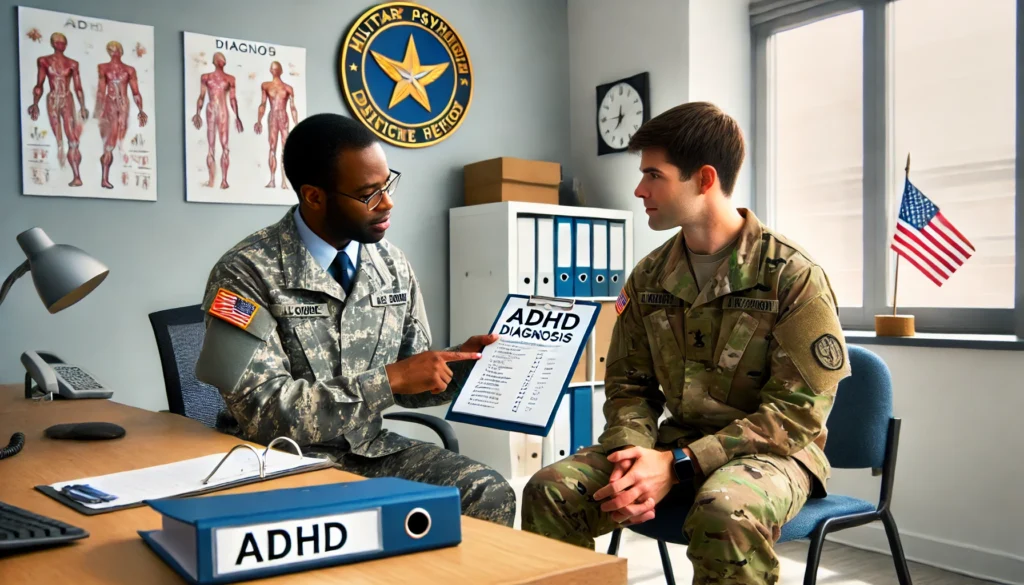ADHD is characterized by a persistent pattern of inattention, hyperactivity, and impulsivity that interferes with functioning or development. For service members, these symptoms can be exacerbated by the unique demands and stressors of military life, such as the need for sustained concentration, quick decision-making, and adherence to strict protocols.
You may also like: Enhancing Concentration: Strategies for ADHD
Historical Context
Historically, ADHD was often underdiagnosed in adults, including those in the military. Symptoms were frequently mistaken for other issues like stress or anxiety due to the high-stakes environment of military operations. This misdiagnosis was partly because ADHD was traditionally viewed as a childhood disorder. As awareness and understanding have increased, so too has our approach to diagnosing and managing ADHD within the military. The evolution of diagnostic criteria and tools has been pivotal in providing accurate assessments.
Evolution of ADHD Awareness
The shift in understanding ADHD as a lifelong condition rather than just a childhood disorder has been significant. Research over the past few decades has highlighted the persistence of ADHD symptoms into adulthood, especially under the pressure of military duties. This evolution in awareness has led to more comprehensive training for military healthcare providers to recognize and manage adult ADHD.
The Role of Military Culture
Military culture, with its emphasis on discipline and order, can sometimes obscure ADHD symptoms. The structured environment might temporarily mask symptoms of inattention, yet the rigidity can exacerbate impulsivity and hyperactivity. It’s crucial for assessments to consider how military culture and lifestyle can both hide and highlight ADHD traits, thereby influencing diagnosis and treatment approaches.
Who Conducts ADHD Testing in the Military?
The process of diagnosing ADHD in the military involves a multidisciplinary team of healthcare professionals, including psychiatrists, psychologists, and neurologists. Each professional plays a crucial role in ensuring an accurate diagnosis.
Psychiatrists and Psychologists
Psychiatrists and psychologists are typically the first point of contact for service members seeking an ADHD diagnosis. They conduct initial evaluations through interviews, questionnaires, and behavior assessments. These professionals are trained to differentiate ADHD from other mental health conditions that may present with similar symptoms, ensuring a precise diagnosis. Their evaluations often include family history and the impact of symptoms on daily life.
Interview Techniques
Interviews conducted by psychiatrists and psychologists are structured to elicit detailed information about the service member’s symptoms and their impact on daily functioning. These interviews are crucial for distinguishing ADHD from other conditions like PTSD or anxiety disorders. The skill of the interviewer in probing and interpreting responses is key to a successful diagnosis.
Behavioral Assessments
Behavioral assessments help quantify the extent of symptoms and their impact on the service member’s life. Standardized tests and scales are used to compare the individual’s symptoms against established norms. This data provides a baseline for understanding the severity of ADHD and guides subsequent treatment plans.
Differentiating ADHD from Other Conditions
Psychiatrists and psychologists must differentiate ADHD from other conditions that have overlapping symptoms. This involves considering co-existing conditions and understanding how ADHD manifests differently in adults. A thorough understanding of the individual’s environment, both personal and professional, is necessary to rule out other potential causes of symptoms.
Neurologists
Neurologists may be involved in cases where there are additional concerns about brain health or neurological function. They use specialized tests to assess brain activity and rule out other neurological conditions that could mimic ADHD symptoms. Understanding how a neurologist diagnoses ADHD in adults can be particularly important for service members with complex cases.
Neurological Testing
Neurological testing involves advanced imaging and neurophysiological assessments to evaluate brain function. These tests can identify patterns of brain activity associated with ADHD, providing a deeper understanding of the condition’s neurological basis. This information is crucial for tailoring treatment plans, especially in complex cases.
Collaboration with Other Specialists
Neurologists often collaborate with other specialists to provide a comprehensive assessment. This interdisciplinary approach ensures that all aspects of the service member’s health are considered, leading to a more accurate diagnosis. Such collaboration is vital in complex cases where ADHD symptoms might overlap with other neurological issues.
Importance of a Comprehensive Approach
A comprehensive approach to ADHD diagnosis involves integrating findings from various specialists. This ensures that the diagnosis considers all possible factors, from psychological to neurological, that could influence symptoms. The goal is to create a holistic understanding of the service member’s condition, leading to more effective treatment strategies.

The ADHD Assessment Process
The assessment process for ADHD in the military is thorough and multi-faceted. It often involves several stages to ensure that the diagnosis is accurate and comprehensive.
Initial Consultation
The first step in the ADHD assessment process is an initial consultation. During this appointment, the service member discusses their symptoms and concerns with a healthcare professional. This is an opportunity to explore the individual’s medical history, family history, and any other factors that may be contributing to their symptoms.
Gathering Comprehensive History
A comprehensive history is crucial in the initial consultation. Healthcare professionals gather information about the service member’s medical background, family history of ADHD or other mental health conditions, and any previous treatments. This information provides context for the symptoms and helps guide the assessment process.
Identifying Key Symptoms
During the initial consultation, identifying key symptoms is essential. Service members are encouraged to describe their experiences in detail, focusing on how symptoms affect their daily life and performance. This helps healthcare providers understand the severity and impact of ADHD symptoms.
Setting Expectations
Setting expectations during the initial consultation helps manage the service member’s understanding of the assessment process. Healthcare providers explain the steps involved, the potential outcomes, and the importance of accurate diagnosis. This transparency fosters trust and encourages active participation in the assessment.
Formal Evaluation
The formal evaluation typically includes a series of standardized tests and assessments designed to measure attention, impulsivity, and hyperactivity. These tests provide objective data that can help differentiate ADHD from other conditions.
Standardized Testing Procedures
Standardized testing procedures are designed to objectively assess ADHD symptoms. These tests measure various aspects of attention, impulsivity, and hyperactivity, providing quantitative data to support the diagnosis. The use of standardized tests ensures consistency and reliability in the assessment process.
Role of Cognitive Assessments
Cognitive assessments play a crucial role in the formal evaluation of ADHD. They evaluate the service member’s cognitive functioning, including memory, attention, and executive functions. These assessments help identify specific areas of impairment related to ADHD and guide targeted interventions.
Interpretation of Test Results
Interpreting test results is a critical step in the formal evaluation. Healthcare professionals analyze the data to determine the presence and severity of ADHD symptoms. They consider the results in the context of the service member’s overall health and functioning, ensuring a holistic understanding of the condition.
Diagnostic Criteria
To receive an ADHD diagnosis, a service member must meet the criteria outlined in the Diagnostic and Statistical Manual of Mental Disorders (DSM-5). This includes a specific pattern of symptoms that have persisted for at least six months and have a significant impact on daily functioning.
Understanding DSM-5 Criteria
Understanding the DSM-5 criteria for ADHD is essential for an accurate diagnosis. These criteria outline the specific symptoms and behaviors associated with ADHD, providing a standardized framework for assessment. Healthcare providers use these criteria to ensure consistency and accuracy in diagnosing ADHD.
Assessing Symptom Persistence
Assessing the persistence of symptoms is a key component of the diagnostic process. Symptoms must be present for at least six months and have a significant impact on daily functioning to meet the criteria for ADHD. This ensures that the diagnosis is based on a consistent pattern of behavior rather than isolated incidents.
Evaluating Functional Impact
Evaluating the functional impact of symptoms is crucial in the diagnostic process. Healthcare providers assess how ADHD symptoms affect the service member’s ability to perform daily tasks, both personally and professionally. This evaluation helps determine the severity of the condition and informs the development of a tailored treatment plan.

Military-Specific Considerations
The military environment presents unique challenges and considerations when it comes to diagnosing and managing ADHD.
Impact of Military Life
The structure and demands of military life can both mask and exacerbate ADHD symptoms. For example, the need for strict adherence to routines may temporarily mitigate symptoms of inattention, but the high-stress environment can also lead to increased impulsivity and hyperactivity.
Routine and Structure
Military life is characterized by routine and structure, which can sometimes mask ADHD symptoms. While routines may help manage inattention, they can also create challenges for service members with ADHD, who may struggle with the rigidity of military protocols. Understanding this dynamic is crucial for accurate diagnosis and management.
Stress and ADHD Symptoms
The high-stress environment of military life can exacerbate ADHD symptoms. Stress can increase impulsivity and hyperactivity, making it difficult for service members to manage their symptoms effectively. Recognizing the impact of stress on ADHD is important for developing tailored treatment strategies.
Coping Mechanisms in the Military
Service members often develop coping mechanisms to manage ADHD symptoms in the military environment. These strategies may include relying on peers, using technology to stay organized, or seeking support from superiors. Understanding these coping mechanisms can inform the development of effective management plans.
Confidentiality and Stigma
One of the challenges of seeking an ADHD diagnosis in the military is the stigma that can be associated with mental health conditions. Service members may be concerned about the impact of a diagnosis on their career or security clearance. It’s important for military healthcare providers to address these concerns and ensure that confidentiality is maintained throughout the assessment process.
Addressing Stigma
Addressing stigma is a crucial aspect of the assessment process. Healthcare providers must create a supportive environment where service members feel comfortable discussing their symptoms and concerns. This involves educating both service members and military leadership about ADHD and its impact on daily functioning.
Ensuring Confidentiality
Ensuring confidentiality is vital for encouraging service members to seek an ADHD diagnosis. Healthcare providers must communicate the measures in place to protect sensitive information, including how diagnosis and treatment information will be used. This reassurance is key to building trust and encouraging service members to seek help.
Impact on Career
The potential impact of an ADHD diagnosis on a service member’s career is a significant concern. Healthcare providers must be transparent about the implications of a diagnosis and work with service members to mitigate any negative effects. This may include discussing accommodations or adjustments to ensure career progression is not hindered.
Treatment and Management of ADHD in Service Members
Once a diagnosis is made, the focus shifts to the treatment and management of ADHD. This often involves a combination of medication, behavioral therapy, and lifestyle modifications.
Medication
Medication is often a key component of ADHD treatment, helping to manage symptoms of inattention and hyperactivity. Common medications include stimulants like Adderall and Ritalin, as well as non-stimulant options for those who may not tolerate stimulants well.
Types of Medication
There are various types of medication available for managing ADHD. Stimulants, such as Adderall and Ritalin, are commonly prescribed and have been shown to be effective in reducing symptoms. Non-stimulant options, such as Strattera, are available for those who may not respond well to stimulants or prefer a different approach.
Benefits and Side Effects
Medications for ADHD can provide significant benefits, including improved focus, reduced impulsivity, and better overall functioning. However, they may also have side effects, such as sleep disturbances or appetite changes. It’s important for healthcare providers to monitor these side effects and adjust treatment as needed.
Monitoring and Adjustment
Regular monitoring and adjustment of medication are essential for effective ADHD management. Healthcare providers work closely with service members to assess the effectiveness of medication and make any necessary changes. This ensures that treatment remains aligned with the individual’s needs and goals.
Behavioral Therapy
Behavioral therapy can be an effective tool for managing ADHD, helping service members develop strategies to cope with symptoms and improve their functioning in a military environment.
Cognitive Behavioral Therapy (CBT)
Cognitive Behavioral Therapy (CBT) is a common approach used to address ADHD symptoms. It helps service members identify negative thought patterns and develop healthier coping strategies. CBT can improve self-regulation and enhance problem-solving skills, which are crucial in a military setting.
Skills Training
Skills training focuses on developing practical skills to manage ADHD symptoms. This may include time management, organization, and communication strategies. These skills are essential for maintaining efficiency and effectiveness in a military environment.
Support Groups
Support groups provide a valuable platform for service members to share experiences and coping strategies. These groups offer peer support and foster a sense of community, reducing feelings of isolation. They also provide an opportunity for service members to learn from others who are managing similar challenges.
Lifestyle Modifications
Lifestyle modifications, such as regular exercise, a healthy diet, and adequate sleep, can also play a crucial role in managing ADHD symptoms. These modifications can help improve concentration, reduce impulsivity, and enhance overall well-being.
Importance of Exercise
Regular exercise has been shown to have a positive impact on ADHD symptoms. It helps improve focus and reduce impulsivity by increasing the production of neurotransmitters that regulate attention and mood. Encouraging service members to incorporate physical activity into their routines can enhance overall well-being.
Nutritional Considerations
A healthy diet plays a vital role in managing ADHD symptoms. Certain nutrients, such as omega-3 fatty acids, have been linked to improved cognitive functioning. Healthcare providers can offer guidance on nutritional choices that support optimal brain health and symptom management.
Sleep Hygiene
Adequate sleep is essential for managing ADHD symptoms. Establishing a consistent sleep routine and creating a conducive sleep environment can improve attention and reduce impulsivity. Healthcare providers can offer strategies to promote better sleep hygiene, which can enhance overall functioning.

Future Implications and Research
As our understanding of ADHD continues to evolve, so too do the protocols for assessing and managing it in service members. Ongoing research is focused on developing more effective diagnostic tools and treatments that are tailored to the unique needs of the military population.
Advances in Diagnostic Tools
Research is ongoing to develop more advanced diagnostic tools for ADHD. This includes exploring new technologies, such as neuroimaging and genetic testing, to enhance the accuracy of assessments. These advancements could lead to earlier and more precise diagnoses, improving outcomes for service members.
Personalized Treatment Approaches
There is increasing interest in personalized treatment approaches for ADHD. This involves tailoring interventions to the individual’s unique needs and circumstances, considering factors such as genetics, lifestyle, and co-existing conditions. Personalized approaches have the potential to improve treatment effectiveness and overall quality of life.
Impact of Ongoing Research
Ongoing research is crucial for advancing our understanding of ADHD and improving management strategies. Studies focusing on the military population are particularly important, as they address the unique challenges faced by service members. Continued investment in research will lead to more effective interventions and better support for those with ADHD.
In conclusion, ADHD assessment protocols for service members are designed to provide a comprehensive and accurate diagnosis, taking into account the unique challenges of military life. By understanding the process and seeking appropriate care, service members can effectively manage their symptoms and maintain their operational readiness.
Further Reading:
Looking for an online ADHD test?
Adult ADHD Assessment and Diagnosis
Effort Underway to Develop First U.S. Guidelines for ADHD in Adults
Important Note: The information contained in this article is for general informational purposes only, and should not be construed as health or medical advice, nor is it intended to diagnose, prevent, treat, or cure any disease or health condition. Before embarking on any diet, fitness regimen, or program of nutritional supplementation, it is advisable to consult your healthcare professional in order to determine its safety and probable efficacy in terms of your individual state of health.
Regarding Nutritional Supplements Or Other Non-Prescription Health Products: If any nutritional supplements or other non-prescription health products are mentioned in the foregoing article, any claims or statements made about them have not been evaluated by the U.S. Food and Drug Administration, and such nutritional supplements or other health products are not intended to diagnose, treat, cure, or prevent any disease.


